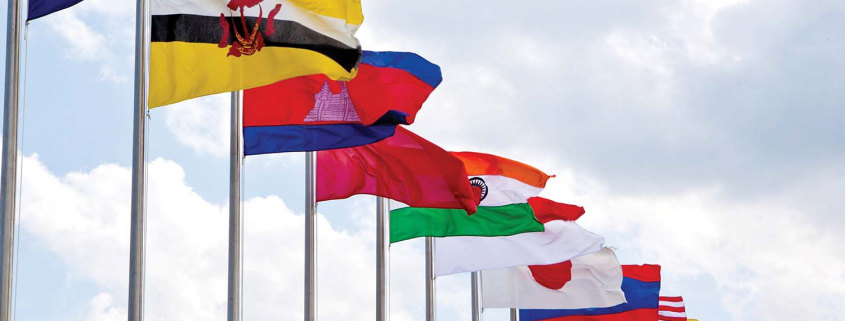ASEAN: A Safe Haven for Ruling Class?
by M. Daffa Syauqi A (Photo by Lance Cpl. Kasey Peacock)
It has been 52 years since the conception of ASEAN in 1967 as the leading inter-state organization in Southeast Asia. Built on the spirit of similar history as former colonialized coutry as well to prevent the spread of Communism in the region, ASEAN has steadily making progress in various aspects within state-building process such as security, economy as well as cultural cooperation. It was further emphasized by the creation of three pillars consisted of Political-Security Community, Economic Community, as well as Socio-Cultural Community (ASEAN, 2015) as the framework for the following actions taken by ASEAN to further integrate the region. However with such progress the capability of ASEAN to enforce the recognition of declaration it made must be questioned, especially when it touched the sphere of Political-Security Community that are still often considered as ‘taboo’ and ‘sensitive’ issue. In this paper the author would like to bring up the issue of ASEAN principles in protecting various ruling class policies and actions within ASEAN state members, the issue will be exemplified in three countries which are Indonesia, Phillippines, and Myanmar.
Within the scope of ASEAN, it was acknowledged that the principle of non-intereference signed in the Treaty of Amity and Cooperation in 1976 proved to be a vital instrument in keeping order in ASEAN (ASEAN, 1976) to allow each of the state members to respect each other domestic politics and promised not to intervene within each other affairs. Within Political-Security matter, this might cause a contradicting policy to be applied in various Southeast Asian states considering that most of the countries still have tendency to fall into dictatorship as military influence within the newly-born democratic ideas are still gripping strong in these countries. Such example could be seen on the direct violation of ASEAN Human Rights Declaration that was signed in 2012 at Phnom Penh, Cambodja (ASEAN, 2012) that defines the general principles of Human Rights protection in Southeast Asia consisted of Civil & Political rights, Economic, Social and Cultural rights, Right to Development and Right to Peace. In this case, the audience may see Indonesia under Joko Widodo administration brutally repressing Papua demonstrator for their demand of independence due to the lack of development in the region (Tasevski, 2019), then Philippines within Duterte’s administration where thousands of people died due to its brutal crackdown on drugdealers and users that are rampant within the country (Ellis-Petersen, 2018), and last but not least the ethnic genocide of Rohingya that currently happened in Myanmar under the watch of Noble prize winner Aung San Suu Kyii and regarded as one of the worst genocidal case in Southeast Asia (Safdar & Siddiqui, 2019).
Despite these atrocities, there are no single action from ASEAN or its state members to stop these policies besides ‘condemning’ the action or simply sending in protests. The principle of non-interference stands as the lack of rigid enforcer of Human Rights Declaration ASEAN has made few years prior. Be it reminded that when it was brought within the context of local politics, both of these leaders have appeased to the populists demands in the creation of these policies. Without any enforcer entity stronger than the overall position of state members, ASEAN will upheld its status quo in reserving its lack of willingness in the creation of, in this case, human rights norms within the region meanwhile allowing more atrocities to happen. In comparison to European Union, they had clear and distinct bureaucratic level, the creation of European Commission as the executive branch of regional decision-making as well as Court of Justice of the European Union that acts judiscial entity of the region, making a clear indication that European Union is indeed one-way above state, wielding the capability to bring out the jurisdiction and enforcement to its member states upon dealing with an issue.
In ASEAN however, it is often doubted that ASEAN will not be able to create nor willing to create similar position as European Union has made now, considering that the status quo that is currently going on in ASEAN right now is working in ruling class’ favor. The requirement of having able to settle one’s issue without any interference from outside actors proved to be an invaluable elements that ASEAN can provide to its member states as state-building progress are considered to be far more important than other issues, therefore each of the ruling class in member states cannot afford to have an uprising or movement that challenges their state-building progress.
Reference List
ASEAN. (2015). Declaration of ASEAN Concord II (Bali Concord II. Retrieved from http://www.asean.org/news/item/declaration-of-asean-concord-ii-bali-concord-ii
ASEAN, (1976). Treaty of Amity and Cooperation in Southeast Asia Indonesia, 24 February 1976. Retrieved from https://asean.org/treaty-amity-cooperation-southeast-asia-indonesia-24-february-1976/
ASEAN, (2012). ASEAN Declaration of Human Rights. Retrieved from <https://www.asean.org/storage/images/ASEAN_RTK_2014/6_AHRD_Booklet.pdf>
Tasevski, O., (2019). “West Papua’s Quest for Independence”. The Diplomat. Retrieved from < https://thediplomat.com/2019/07/west-papuas-quest-for-independence/>
Ellis-Petersen, H., (2018). “Duterte’s Philippines drug war death toll rises above 5,000.” The Guardian. Retrieved from < https://www.theguardian.com/world/2018/dec/19/dutertes-philippines-drug-war-death-toll-rises-above-5000>
Safdar, A. & Usaid Siddque, (2019). “ICJ speech: Suu Kyi fails to use ‘Rohingya’ to describe minority.” Al-Jazeera. Retrieved from < https://www.aljazeera.com/news/2019/12/aung-san-suu-kyi-fails-word-rohingya-icj-speech-191212102606322.html>
M. Daffa Syauqi A is a last year Undergraduate student majoring in International Relations, Faculty of Social and Political Sciences, Universitas Gadjah Mada, Yogyakarta, Indonesia. Daffa is currently working as an intern at ASEAN Studies Center UGM. He could be reached through email daffa.syauqi97@gmail.com.





Leave a Reply
Want to join the discussion?Feel free to contribute!